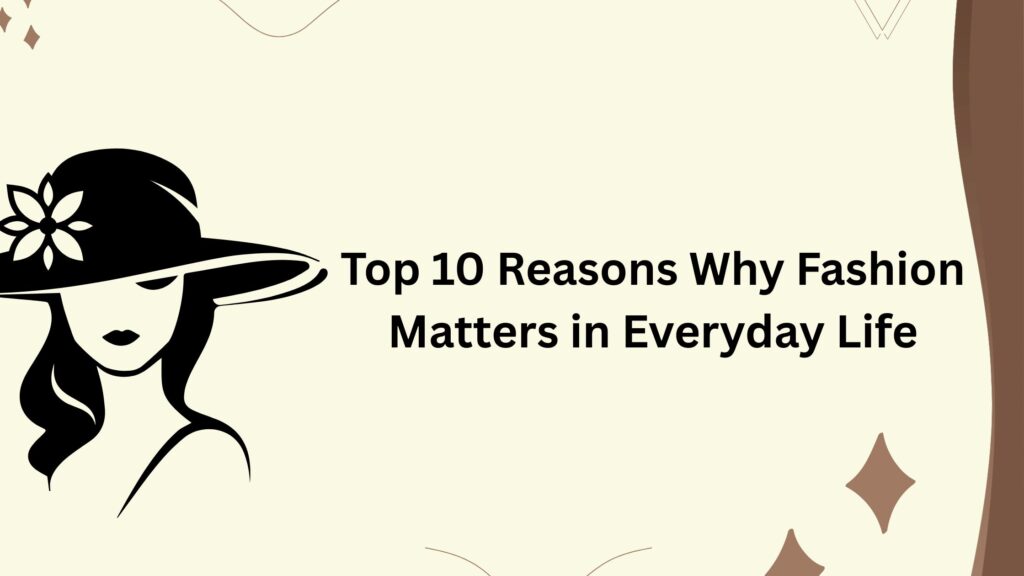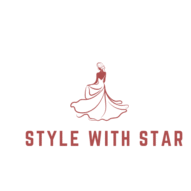When most people hear the word fashion, they think of glossy magazines, red-carpet events, or luxury runways filled with glamorous models. But the truth is, fashion isn’t just for the elite—it’s a universal part of everyday life that affects everyone, no matter their age, culture, or background.
The clothes we choose in the morning, the styles we admire, and the trends we follow all contribute to how we present ourselves to the world. Fashion is not only about dressing well—it’s about expression, culture, creativity, and confidence.
In this article, we’ll explore the top 10 reasons why fashion matters in everyday life, with in-depth insights, real-world examples, and the positive impact it has on society.

1. First Impressions Count
It is often said, “You never get a second chance to make a first impression.” And in most cases, the first impression is visual. What we wear speaks volumes before we even say a word.
Think about a job interview—if two candidates have the same skills, the one who presents themselves in a polished, confident manner is often perceived more favorably. Similarly, when meeting someone new at a social gathering, your outfit becomes part of the story you tell about yourself.
This doesn’t mean you need expensive designer labels; it’s about choosing clothing that reflects your personality and suits the occasion. A crisp shirt may speak professionalism, while a casual yet stylish outfit may express creativity and confidence.
Fashion helps us make those first few seconds impactful, allowing others to see us the way we want to be seen.
2. Boosts Self-Confidence
Have you ever noticed how your mood changes when you wear an outfit you love? Fashion has the power to boost confidence instantly.
For example, slipping into a perfectly tailored dress or a sharp suit can make you feel unstoppable. Even casual outfits—like your favorite jeans paired with a trendy top—can elevate your mood.
Studies show that what you wear influences not just how others perceive you but also how you perceive yourself. This is known as “enclothed cognition,” a psychological concept that explains how clothing affects the way we think and perform.
By choosing clothes that make us feel good, we strengthen our self-image, which reflects in our behavior, posture, and communication. Confidence is contagious, and fashion plays a direct role in building it.
3. A Form of Self-Expression
Fashion is often called wearable art. Just like painters use brushes or musicians use instruments, individuals use clothing as a tool for self-expression.
Your outfit tells the world who you are—whether bold, sophisticated, artistic, or minimal. Wearing bright colors may show energy and positivity, while a monochrome look might reflect elegance and simplicity.
Celebrities like Lady Gaga, Rihanna, or Harry Styles are great examples of fashion as self-expression. They use their wardrobe choices to challenge norms, break stereotypes, and showcase individuality.
But self-expression through fashion isn’t limited to celebrities. Every time you choose an outfit, you are making a statement about your mood, values, and personality. Fashion gives everyone the canvas to express themselves authentically.
4. Cultural Connection
Fashion is deeply tied to culture, heritage, and tradition. Every region in the world has unique clothing styles that carry meaning and history.
For instance:
- India is known for its sarees, lehengas, and kurta-pajamas that symbolize tradition and grace.
- Japan celebrates its culture with the kimono, a timeless garment.
- Scotland has the kilt, an iconic piece of clothing with strong historical roots.
Fashion keeps these cultural identities alive, allowing people to honor their roots while embracing modern styles. During festivals and special occasions, traditional attire plays an essential role in connecting communities and strengthening bonds.
Moreover, fashion also bridges cultures. Modern global trends often mix Western and ethnic elements—like pairing sneakers with sarees or blazers with dhotis—proving that fashion is not static but an evolving blend of tradition and innovation.
5. Adaptability in Different Roles
One of the most practical aspects of fashion is its adaptability. We all play different roles in life—student, professional, parent, friend—and fashion helps us adapt to each setting.
At work, formal wear may be essential to reflect professionalism. During leisure time, casual wear allows us to relax and feel comfortable. At weddings or celebrations, festive clothing highlights the joy of the occasion.
Fashion gives us the freedom to shift roles seamlessly, providing the right look for every situation. It’s not about following rules but about aligning your clothing with the context, mood, and environment.
6. Economic Impact of Fashion
Fashion is not just an art—it’s an industry that fuels the global economy. From designers and tailors to textile workers, retailers, influencers, and photographers, millions of people worldwide are employed because of fashion.
According to reports, the fashion industry is worth over $2.5 trillion globally, making it one of the largest sectors. By purchasing clothes—whether from high-end boutiques or local artisans—consumers contribute to this economy and support livelihoods.
Fashion also encourages entrepreneurship. Many small businesses, thrift shops, and independent designers thrive because fashion lovers are constantly seeking unique, stylish products.
When we support sustainable and ethical fashion, we also play a role in shaping the future of the industry in a responsible way.
7. Influence on Society & Trends
Fashion is not isolated—it reflects and influences society. Trends often mirror cultural shifts, political movements, and even technological progress.
For example:
- The hippie fashion of the 1960s was linked to peace and freedom movements.
- Punk fashion in the 1970s expressed rebellion and anti-establishment views.
- Today’s sustainable fashion movement reflects growing concern about the environment.
Social media platforms like Instagram and TikTok have accelerated how quickly trends spread, turning street style and influencer looks into global phenomena overnight.
Fashion is a mirror of society’s values—and sometimes, it also shapes them.
8. Encourages Creativity
Fashion is an endless playground for creativity. It’s about experimenting with colors, patterns, fabrics, and accessories to create something unique.
Even simple choices—like pairing sneakers with dresses or layering jackets—allow room for innovation. Designers push boundaries with avant-garde collections, while everyday people bring creativity into their wardrobes by mixing high fashion with streetwear.
DIY fashion trends, thrift flips, and upcycling old clothes are also ways people express creativity. Fashion teaches us that there are no strict rules—just opportunities to imagine, create, and inspire.
9. Sustainability & Responsibility
Modern fashion is not just about looking good—it’s about making conscious choices. With increasing awareness about climate change and environmental issues, sustainable fashion has become more important than ever.
Fast fashion may provide affordability, but it often harms the environment. Sustainable fashion, on the other hand, focuses on eco-friendly fabrics, fair trade, and recycling. Brands are now innovating with organic cotton, bamboo fabrics, and even lab-grown leather.
As consumers, choosing sustainable fashion means contributing to a healthier planet while still embracing style. Fashion gives us the chance to be stylish and responsible at the same time.
10. Everyday Happiness
Fashion adds joy to daily life. Dressing up for birthdays, weddings, festivals, or even a casual coffee date creates a sense of excitement.
There’s a reason why people look forward to festive seasons—it’s not just about rituals but also about the joy of dressing up in special outfits. Even small moments, like wearing a new pair of shoes or your favorite scarf, can brighten your day.
Fashion is not just practical—it’s emotional. It allows us to celebrate life’s little and big moments with color, texture, and creativity.
🌟 Conclusion
Fashion is not limited to runways or designer brands—it’s a powerful, everyday influence that shapes confidence, culture, creativity, and society. From expressing individuality to preserving traditions, from driving economic growth to inspiring sustainability, fashion plays a role in every corner of life.
At StyleWithStar, we believe fashion is about more than just clothes—it’s about embracing who you are. It’s about shining with confidence, telling your story through style, and celebrating life with creativity and grace.
So, the next time you choose an outfit, remember—it’s not just clothing. It’s your statement, your mood, your culture, and your art. 🌸✨
